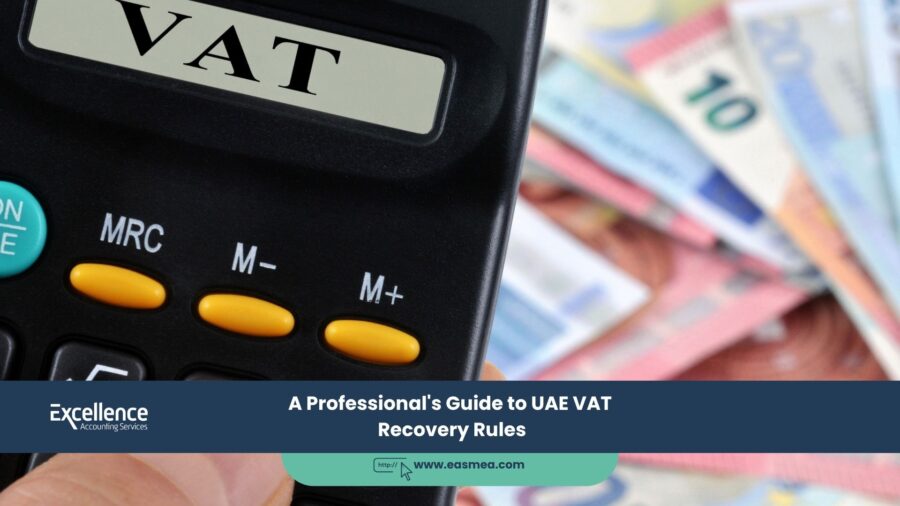A Professional’s Guide to UAE VAT Recovery Rules
For businesses operating in the UAE, Value Added Tax (VAT) is a fundamental part of the financial landscape. While much focus is placed on the obligation to charge and remit output VAT, the other side of the equation—input VAT recovery—is where strategic financial management truly shines. Input tax recovery is not merely an administrative task; it is a critical mechanism for managing cash flow and protecting profit margins. Every dirham of VAT that a business is entitled to recover but fails to claim is a direct and unnecessary leakage from its bottom line.
- A Professional's Guide to UAE VAT Recovery Rules
- Part 1: The Golden Rule - Fundamental Conditions for VAT Recovery
- Part 2: The Blocked List - What You Can Never Claim
- Part 3: The Apportionment Challenge for Mixed Supplies
- Part 4: Special Scenarios in VAT Recovery
- How Excellence Accounting Services (EAS) Maximizes Your VAT Recovery
- Frequently Asked Questions (FAQs)
- Are You Leaving Money on the Table?
However, the right to recover input VAT is not absolute. It is governed by a detailed and strict set of rules, conditions, and exceptions laid out in the UAE’s VAT legislation. Claiming VAT on non-eligible expenses or failing to hold the correct documentation can lead to claim rejection, reassessments, and significant penalties during an FTA audit. This professional guide provides a deep dive into the intricacies of VAT recovery in the UAE. We will explore the core principles, dissect the rules on blocked and apportioned expenses, and outline the best practices for documentation and reporting to ensure your business maximizes its legitimate VAT recovery and maintains impeccable compliance.
Key Takeaways on VAT Recovery
- The Taxable Supply Link: The golden rule of VAT recovery is that you can only claim input tax on expenses incurred to make “taxable supplies” (standard-rated or zero-rated).
- Valid Tax Invoice is Mandatory: No valid tax invoice means no right to recover. The invoice must meet all the specific requirements set by the FTA.
- Blocked Expenses are Non-Recoverable: VAT on certain expenses, primarily specific entertainment services and motor vehicles available for personal use, is explicitly blocked from recovery.
- Apportionment is Required for Mixed-Use: If your business makes both taxable and exempt supplies, you must apportion your input tax and can only claim the portion related to your taxable activities.
- Documentation is Everything: Meticulous record-keeping is the foundation of a successful and defensible VAT recovery position.
Part 1: The Golden Rule – Fundamental Conditions for VAT Recovery
The entire framework of VAT recovery rests on a simple principle: you can reclaim the VAT you pay on your business costs only if those costs are used to generate taxable revenues. This prevents non-taxable activities from benefiting from tax refunds. To successfully recover any input VAT, two fundamental conditions must be met.
Condition 1: The Link to Taxable Supplies
Input tax is only recoverable to the extent that the expense relates to the making of taxable supplies. In the UAE, taxable supplies fall into two categories:
- Standard-Rated Supplies (5%): Most domestic sales of goods and services.
- Zero-Rated Supplies (0%): Specific categories like certain exports, international transportation, certain educational services, and certain healthcare services.
Crucially, if an expense is used to make Exempt Supplies (e.g., certain financial services, supply of bare land, local passenger transport), the VAT incurred on that expense is not recoverable. This distinction between zero-rated and exempt supplies is one of the most important concepts in VAT.
A business that only makes zero-rated exports can recover 100% of its input VAT, often resulting in regular VAT refunds. A business that only provides exempt financial services cannot recover any of its input VAT. This is why thorough financial reporting that correctly categorizes revenue is essential.
Condition 2: Possession of a Valid Tax Invoice
This is a rigid, document-driven requirement. To claim input tax, you must hold a valid tax invoice for the supply. The FTA is extremely strict on this point. A valid tax invoice must clearly show:
- The words “Tax Invoice” displayed prominently.
- The name, address, and Tax Registration Number (TRN) of the supplier.
- The name, address, and TRN of the recipient (if the recipient is a registrant).
- A unique invoice number and the date of issue.
- A description of the goods or services supplied.
- The total amount payable, excluding VAT.
- The total amount of VAT charged, shown in AED.
- The rate of VAT applied and the amount payable in AED.
A simple payment receipt, delivery note, or pro-forma invoice is not sufficient. Without an invoice that meets these criteria, your claim for input tax can be denied during an audit, even if the expense was legitimate.
Part 2: The Blocked List – What You Can Never Claim
While most legitimate business expenses are eligible for VAT recovery (subject to the taxable supply link), the UAE VAT law specifically “blocks” the recovery of input tax on a few key categories, regardless of business purpose.
1. Entertainment Services
Input tax is not recoverable on any costs related to providing entertainment to anyone who is not an employee. This includes:
- Clients or potential clients
- Investors
- Shareholders
- Officials from other organizations
“Entertainment” is broadly defined and includes hospitality of any kind, such as food and drink, hotel accommodation, entry to shows or events, and pleasure or sporting trips. For example, the VAT on taking a client out for a business lunch is blocked and cannot be recovered.
The Employee Exception: The block does not apply to entertainment provided to employees if it’s for a genuine business purpose (e.g., a staff lunch during a training day or a year-end staff party). The VAT on these costs is generally recoverable. Accurate payroll services and expense reporting are vital to distinguish these properly.
2. Motor Vehicles Available for Personal Use
Input tax cannot be recovered on the purchase, lease, or running costs (fuel, servicing, insurance) of a motor vehicle that is available for an employee’s personal use.
What is a “motor vehicle”? It’s a road vehicle designed or adapted for the conveyance of not more than 10 people. This typically includes sedans, SUVs, and similar cars.
When is VAT recoverable? VAT can be recovered if the motor vehicle is used exclusively for business and is not available for private use. Examples include:
- A delivery van.
- A taxi used by a transport company.
- A vehicle that is part of a car rental company’s stock.
Businesses need a formal, enforced policy preventing private use to be able to claim this VAT.
Part 3: The Apportionment Challenge for Mixed Supplies
Many businesses are not clear-cut; they make both taxable and exempt supplies. For example, a bank provides standard-rated advisory services (taxable) and exempt loan services (exempt). This creates a challenge for VAT recovery on general overheads like rent, utilities, or audit fees, which support the entire business.
In this situation, the business cannot recover 100% of the input tax on these shared costs. It must apportion the VAT based on the proportion of its taxable business activity.
The Standard Apportionment Method
The default method is a two-stage process:
- Identify input tax that relates directly to taxable supplies (100% recoverable).
- Identify input tax that relates directly to exempt supplies (0% recoverable).
- For the remaining “residual” input tax (on shared overheads), apply the following formula:
(Total Value of Taxable Supplies / Total Value of All Supplies) x 100 = Recovery Percentage
This percentage is then applied to the residual VAT amount to determine how much can be claimed. This calculation must be done for each tax period, requiring a robust accounting review process.
Part 4: Special Scenarios in VAT Recovery
1. Pre-Registration VAT Recovery
A business can, in its first VAT return, claim back VAT it incurred on expenses *before* its VAT registration date. The conditions are:
- For Goods: The goods must still be on hand at the date of registration.
- For Services: The services must have been received not more than 5 years before the date of registration.
- In both cases, the expenses must be for the purpose of making taxable supplies after registration.
2. The Capital Assets Scheme
When a business buys a high-value capital asset (e.g., a building or a large piece of machinery), it typically recovers the full input VAT upfront. The Capital Assets Scheme ensures that this initial recovery is adjusted over time if the use of the asset changes.
- Adjustment Period: 10 years for buildings, 5 years for all other capital assets.
- How it works: Each year, the business must review the asset’s use. If the percentage of taxable use changes (e.g., a building initially used 100% for taxable activities is later partially rented out in an exempt lease), a portion of the initially recovered VAT must be paid back to the FTA.
The Power of a Flawless Audit Trail
Every rule and scenario discussed comes back to one thing: proof. An FTA auditor will not accept a claim without a clear, documented trail. A disorganized system of paper invoices and spreadsheets is a significant risk. Using a cloud accounting platform like Zoho Books is essential. It allows you to attach a digital copy of the tax invoice directly to the expense transaction, creating an unshakeable, instantly accessible record for every single input tax claim. This is your best defense in an audit.
How Excellence Accounting Services (EAS) Maximizes Your VAT Recovery
Navigating the complexities of VAT recovery requires expertise and attention to detail. The team at EAS ensures you claim every dirham you are legally entitled to while maintaining full compliance.
- VAT Recovery Reviews: We conduct detailed reviews of your expenses to identify all eligible input tax, including easily missed items, ensuring you maximize your claims.
- Expert VAT Return Filing: Our VAT return filing services ensure accurate calculations, especially for complex apportionments and capital asset adjustments.
- VAT Health Checks: Proactive health checks by our VAT consultants can identify and rectify issues with your recovery process before they become a problem in an FTA audit.
- Strategic CFO Services: Our CFO services help you manage the cash flow implications of VAT, turning your VAT refund cycle into a predictable part of your financial planning.
- Audit Representation: Should the FTA query your claims, our experts will represent you, providing the necessary documentation and legal arguments to defend your position.
Frequently Asked Questions (FAQs)
By far, the most common reason is the lack of a valid tax invoice. Minor errors on the invoice, such as a missing TRN or an incorrect VAT amount, can be enough for the FTA to deny the claim. It is crucial to check every invoice you receive for compliance.
Yes, generally. These costs are incurred for the purpose of motivating staff and improving business operations, so they have a clear business purpose. The “entertainment” block only applies to non-employees like clients or investors.
It depends entirely on its use. If the car is taken home by the manager and used for personal trips (commuting, weekends), then it is “available for personal use,” and no VAT can be recovered on its purchase or running costs. If it’s a pool car that remains at the office overnight and is used strictly for business trips, you may be able to recover the VAT, but you must be able to prove this policy is enforced.
You should claim input tax in the first tax period in which you receive the valid tax invoice and intend to pay the supplier. The law allows you to claim it in the tax period immediately following this one if you miss the first window, but it is best practice to be prompt.
Officially, no. The law requires you to hold the original valid tax invoice. You should immediately contact your supplier and request a copy. While the FTA has, in rare cases, accepted alternative evidence, this is not a standard practice and should not be relied upon.
Yes. Because zero-rated supplies are a category of “taxable supplies,” any VAT you incur on your business expenses (e.g., rent, raw materials, shipping costs) is fully recoverable. This typically means your business will be in a regular VAT refund position.
This is a critical distinction. For expenses related to zero-rated supplies, you CAN recover the input VAT. For expenses related to exempt supplies, you CANNOT recover the input VAT. From a recovery perspective, making zero-rated supplies is far more advantageous.
Yes, as long as you have a valid tax invoice. The method of payment (cash, credit card, bank transfer) is irrelevant to your right to recover VAT. The deciding factor is the compliant tax invoice and the link to your taxable business activities.
Yes, in almost all cases. The mechanism for recovering business input tax is through the VAT return, which can only be filed by a VAT registrant. Non-registrants cannot recover the VAT they incur, which becomes a direct cost to them.
Imagine you buy a machine (5-year asset life) for AED 100,000 + AED 5,000 VAT. In Year 1, you use it 100% for taxable supplies and recover the full AED 5,000. In Year 2, your business changes, and you now use it 60% for taxable supplies and 40% for exempt supplies. You must perform an adjustment. You have had an “increased” non-taxable use of 40%. You would need to pay back (AED 5,000 / 5 years) * 40% = AED 400 to the FTA in your Year 2 tax return.
Conclusion: Transforming VAT Recovery into a Business Asset
VAT recovery is more than a compliance chore; it is a vital component of a company’s financial health. A proactive and knowledgeable approach can unlock significant cash flow and prevent costly errors. By understanding the core principles, mastering the details of blocked items and apportionment, and underpinning the entire process with robust documentation and technology, businesses in the UAE can transform VAT recovery from a perceived burden into a strategic asset that supports growth and profitability.




